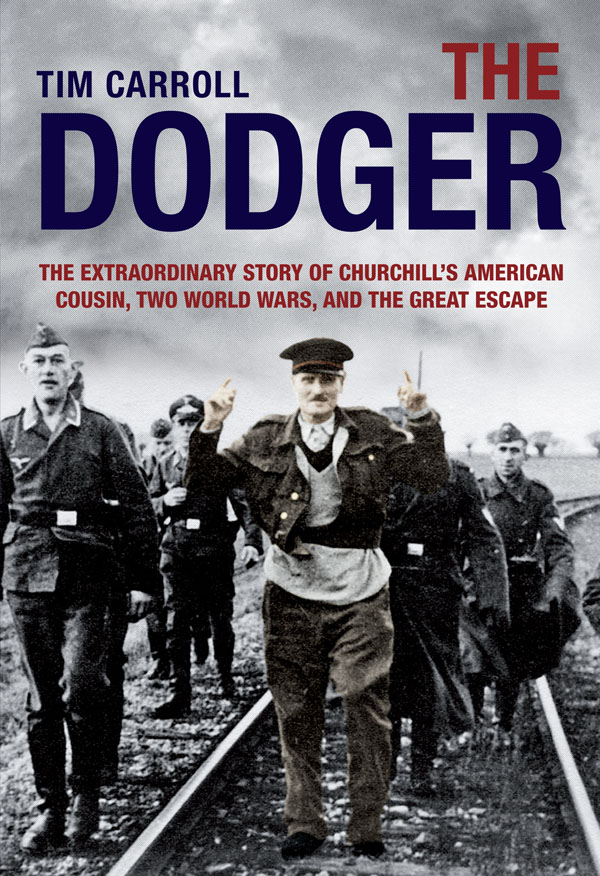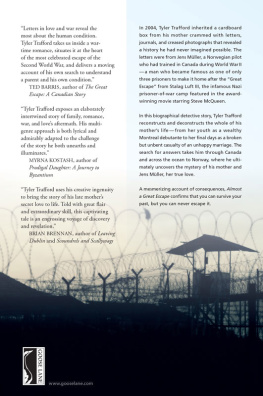
T HE D ODGER
A LSO B Y T IM C ARROLL
The Great Escapers
T HE D ODGER
The Extraordinary Story of Churchills American Cousin, Two World Wars, and the Great Escape
T IM C ARROLL

Copyright 2013 Tim Carroll
This edition of the UK original title The Dodger by Tim Carroll is published by arrangement with Mainstream Publishing Co Ltd, 7 Albany Street, Edinburgh EH1 3UG. www.mainstreampublishing.com.
The moral right of the author has been asserted.
ALL RIGHTS RESERVED. No part of this book may be reproduced or transmitted in any form by any means, electronic or mechanical, including photocopying and recording, or by any information storage and retrieval system, except as may be expressly permitted in writing from the publisher. Requests for permission should be addressed to Globe Pequot Press, Attn: Rights and Permissions Department, PO Box 480, Guilford, CT 06437.
Lyons Press is an imprint of Globe Pequot Press.
Library of Congress Cataloging-in-Publication Data is available on file.
ISBN 978-0-7627-9419-5
Printed in the United States of America
To Patrick Owen Carroll
Be like Johnny
He was an incredible man: intelligent, fearless... he never had anger or hatred for anyone, not even the Germans. To me, he was like a nineteenth-century man in the twentieth century. I was impressed with his generosity of spirit. He turned his back on a life of privilege and put himself in dangerous situations.
Christopher Reeve, actor, famous for his role in the 1978 film Superman, who starred as Johnny Dodge in the 1988 NBC television mini-series The Great Escape II: The Untold Story
He was one of the kindest and happiest men I have ever met and was always ready to help anybody in trouble.
Jimmy James, Great Escaper, and friend of Johnny Dodge
A UTHOR'S N OTE
Throughout this narrative I refer to Johnny Dodge as Johnny. This might imply a lack of objectivity, but it should not do so. I have been critical or wryly mocking of my subject on several occasions, not least because his wealth and lofty connections made Johnnys war a far more comfortable one than that endured by millions of the less fortunate. However, a central feature of Johnnys appeal is the uncommon affection he aroused in others of vastly different social backgrounds and political temperaments. They usually called him Johnny, and it would seem odd to refer to him as anything else.
A CKNOWLEDGMENTS
I must begin with a posthumous thank you to the late Phyllis Boushall Dodge, whose tireless work on a prospective biography of Johnny did not come to fruition, but whose notes and indices form the bedrock upon which this book rests. Phyllis spent several years traveling the United States and Europe compiling an intricate card index of Johnnys life and times and making voluminous notes. The result was a short unpublished biography entitled John Bigelow Dodge, 18941960: A Prcis of His Life, which she wrote in 1990. Without this material my job would have been very much harder. It was provided to me by Phylliss daughter, Alice Berkeley, whom I must also thank, not least for her patience and good humor while I took far too long to write the book. Alice also supplied me with dozens of photographs belonging to Johnny, many of them taken in the prison camps he was incarcerated in during the war and some of which appear in these pages. They are an invaluable treasure trove of material, much of which has never been seen before.
This book would not have been possible without the help of Jane Aitken, Johnnys former daughter-in-law, the ex-wife of his second son, Tony, and niece of Lord Beaverbrook, Johnnys great friend. Jane saved hundreds of Johnnys letters, diaries, and other papers, and also some family photographs, another valuable material resource that, again, has formed the basis for much of this work. Janes archive is remarkable in that it charts Johnnys life from his very first letters to his mother Flora when he was a boy of five at the Fay School in Massachusetts, through his adventures in the Far East and Caucasus, to almost every single letter he sent from prison camps during the Second World War. Jane was kind enough to allow me to copy much of this material, and patient enough to endure my presence in her condominium one snowy Toronto week in early 2010. I am most grateful to her for her patience and good nature.
I must also thank Camilla Dodge, Tonys second wife and widow, for an entertaining lunch and afternoon at her Hampshire home. (She told me that when Tony was asked about his father he would sometimes say, I dont really know much about him: he was in prison for most of my life.) Equally, thanks to Johnnys elder son, David, and his wife, Elizabeth, who live in Devon, for their recollections and memories of Johnny. I am inordinately grateful to Johnnys stepson, Peter Sherman, in Tampa, Florida, for giving me carte blanche to use segments of his extremely entertaining memoir of his own remarkable life, Memoirs of Another Time, much of which concerns Johnny. Memoirs of Another Time has thus far failed to find a publisher, which is sad given the quality of its content, so I hope this book might encourage a publisher to consider Peters fine manuscript.
Thanks also to June Bowerman, the daughter of Wings Day, Johnnys great friend, for her memories of a noble man. The late Sydney Dowse and the late Jimmy James, who endured captivity with Johnny in many camps and escaped with him in the most famous escapades, were generous with their memories over the years, before they both died within weeks of each other in 2008. Other former inmates of Stalag Luft III were also helpful, not least Alan Bryett and Bill Ash in London and the late Albert Patton Clark, senior American officer at Stalag Luft III, whom I interviewed on several occasions at the United States Air Force Academy in Colorado Springs for a television series about the Great Escape.
David Saunders of the Gallipoli Association, who, like so many others, has long hoped that a biography of Johnny Dodge would be written, was particularly helpful, as was Leonard Sellers, author of The Hood Battalion (1995), who provided me with photographs of Johnny during the First World War, and Valerian Freyberg, the current Lord Freyberg, grandson of Johnnys First World War commanding officer, who granted me permission to use them. I have used excerpts from The Hood Battalion for my chapters dealing with the First World War, with grateful thanks to Leonard. Thanks to Peter Elliott, Head of the Department for Research and Information Service at the Royal Air Force Museum, Hendon; the staff at the British Library; the British Newspaper Library; the German Historical Institute; the Imperial War Museum; and the National Archives, who were, as ever, generous with their time and patient with my queries.
I am indebted to my fellow author David Garnett, who was kind enough to give me a leisurely summer tour around Ferring, the Sussex seaside home and resting place of Johnny and his wife, Minerva. David guided me to their tombstones in St Andrews Church and showed me Florida, the quaint home where they enjoyed so many happy days, and the site of Wookyi-Tipi, where Johnnys mother, Flora, lived with her husband, Lionel Guest. He was also good enough to introduce me to Ed Miller, who provided me with valuable historical background to the Guests and Dodges life and times in this beautiful seaside haven.
At Mainstream Publishing I am grateful to my friend Bill Campbell, publisher and joint managing director, for commissioning this book, and to Ailsa Bathgate, Graeme Blaikie, and Claire Rose in the editorial department; I also thank Eleanor Collins, my editor, for her patience and assistance in scrutinizing the manuscript and making sure it met her standards. Any errors are entirely my own. I apologize in advance for any that might occur and, if they are brought to my attention, will do my utmost to correct them in future editions.
Next page









